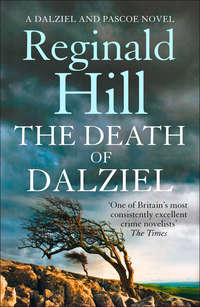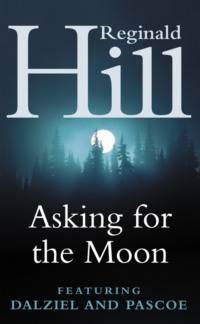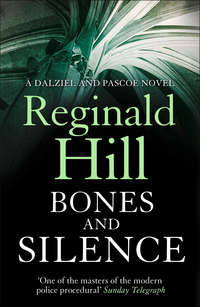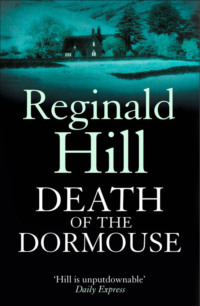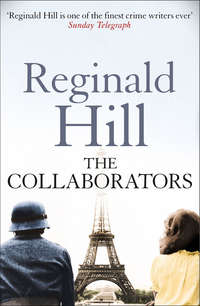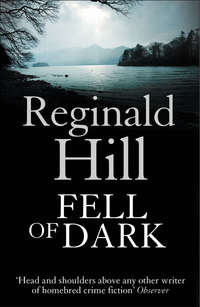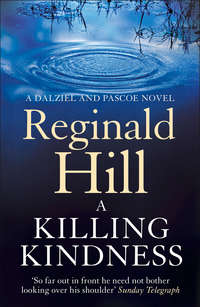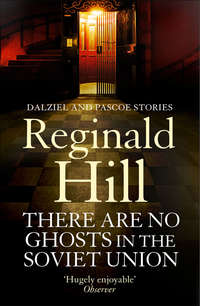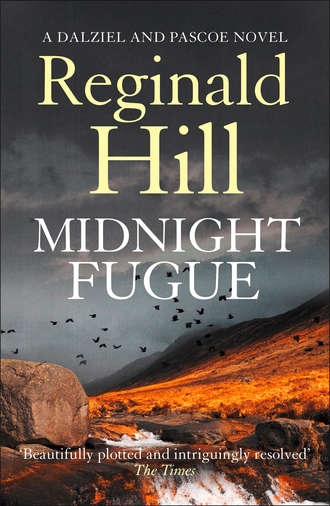
Полная версия
Midnight Fugue

REGINALD HILL
MIDNIGHT FUGUE
A Dalziel and Pascoe novel

Copyright
Harper An imprint of HarperCollinsPublishers
1 London Bridge Street,
London SE1 9GF
www.harpercollins.co.uk
Published by HarperCollinsPublishers 2009
Copyright © Reginald Hill 2009
Reginald Hill asserts the moral right to be identified as the author of this work
A catalogue record for this book is available from the British Library
This novel is entirely a work of fiction. The names, characters and incidents portrayed in it are the work of the author’s imagination. Any resemblance to actual persons, living or dead, events or localities is entirely coincidental.
All rights reserved under International and Pan-American Copyright Conventions. By payment of the required fees, you have been granted the non-exclusive, non-transferable right to access and read the text of this e-book on-screen. No part of this text may be reproduced, transmitted, down-loaded, decompiled, reverse engineered, or stored in or introduced into any information storage and retrieval system, in any form or by any means, whether electronic or mechanical, now known or hereinafter invented, without the express written permission of HarperCollins e-books.
HarperCollinsPublishers has made every reasonable effort to ensure that any picture content and written content in this ebook has been included or removed in accordance with the contractual and technological constraints in operation at the time of publication.
Source ISBN: 9780007252701
Ebook Edition © JUNE 2009 ISBN: 9780007292899
Version: 2015-06-22
Contents
Cover
Title Page
Copyright
Part One Accelerando
Prelude
Chapter One - 08.10–08.12
Chapter Two - 08.12–08.20
Chapter Three - 08.12–08.21
Chapter Four - 08.12–08.25
Chapter Five - 08.25–08.40
Chapter Six - 08.25–08.40
Chapter Seven - 08.25–08.55
Chapter Eight - 09.00–09.20
Chapter Nine - 08.55–09.15
Chapter Ten - 08.55–09.05
Chapter Eleven - 09.15–09.30
Chapter Twelve - 09.31–09.40
Chapter Thirteen - 09.50–10.30
Chapter Fourteen - 10.45–11.02
Chapter Fifteen - 10.50–11.05
Chapter Sixteen - 10.55–11.20
Part Two Con Forza
Prelude
Chapter Seventeen - 12.00–12.15
Chapter Eighteen - 12.10–12.20
Chapter Nineteen - 12.15–12.25
Chapter Twenty - 12.20–12.30
Chapter Twenty-One - 12.20–12.35
Chapter Twenty-Two - 12.20–12.35
Chapter Twenty-Three - 12.20–12.40
Chapter Twenty-Four - 12.35–13.15
Chapter Twenty-Five - 13.00–13.40
Chapter Twenty-Six - 13.00–13.50
Chapter Twenty-Seven - 13.00–13.30
Part Three Misterioso
Prelude
Chapter Twenty-Eight - 13.45–14.50
Chapter Twenty-Nine - 12.25–15.00
Chapter Thirty - 13.35–15.25
Chapter Thirty-One - 14.45–15.45
Chapter Thirty-Two - 15.20–15.30
Chapter Thirty-Three - 14.45–15.35
Chapter Thirty-Four - 15.50–16.15
Chapter Thirty-Five - 13.35–17.30
Chapter Thirty-Six - 16.35–16.41
Chapter Thirty-Seven - 16.35–17.05
Chapter Thirty-Eight - 16.00–16.30
Chapter Thirty-Nine - 16.30–18.05
Chapter Forty - 16.41–17.15
Chapter Forty-One - 16.42–18.05
Chapter Forty-Two - 17.35–17.55
Chapter Forty-Three - 17.40–17.55
Chapter Forty-Four - 17.10–17.55
Chapter Forty-Five - 17.00–18.00
Part Four Furioso
Prelude
Chapter Forty-Six - 17.55–18.15
Chapter Forty-Seven - 18.10–18.15
Chapter Forty-Eight - 18.15–18.30
Chapter Forty-Nine - 18.05–18.15
Chapter Fifty - 18.33–18.35
Chapter Fifty-One - 18.35–18.50
Chapter Fifty-Two - 18.20–18.48
Chapter Fifty-Three - 18.45–18.52
Chapter Fifty-Four - 18.57–19.22
Chapter Fifty-Five - 18.52–19.23
Chapter Fifty-Six - 19.22–19.30
Chapter Fifty-Seven - 23.15–23.59
Part Five Con Fuoco Poi Smorzando
Postlude
Keep Reading
About the Author
By Reginald Hill
About the Publisher
The raindrops play their midnight fugue Against my window pane. Could I once more fold you in my arms You should not leave again.
Richard Morland: Night Music
PRELUDE
Midnight.
Splintered woodwork, bedroom door flung open, feet pounding across the floor, duvet ripped off, grim faces looking down at him, his wife screaming as she’s dragged naked from his side…
He sits upright and cries, ‘NO!’
The duvet is in place, the room empty, the door closed. And through the thin curtains seeps the grey light of dawn.
As for Gina, she hasn’t been by his side for…days?…weeks?…could be months.
The digital bedside clock reads 5.55. He’s not surprised.
Always some form of Nelson whenever he wakes these days: 1.11 2.22 3.33…
Meaning something bad.
Things go on like this, one morning soon he’s going to wake and the clock will read 6.66…
He is still shaking, his body soaked with sweat, his heart pounding.
He gets out of bed and goes on to the landing.
Even the sight of the front door securely in place can’t slow his pulse, even the shower jets cooling and cleaning his flesh can’t wash away his fear.
He tries to analyse his dream, to get it under control by working out its meaning.
He conjures up the men. Some in uniform, some masked; some familiar, some strangers; some wielding police batons, some swinging hammers…
He gives it up, not because the meaning is too elusive but because it’s too clear.
There is no one to turn to, nowhere to hide.
He looks out of the window into the quiet street, familiar from childhood, whenever that was. Now it seems strange, the houses skewed, the perspectives warped, all colour washed out, like a sepia still from some old horror movie.
He realizes he no longer knows where it leads.
Maybe that’s where salvation lies.
If he doesn’t know, how can they know?
All he has to do is walk away down that street. Once round the corner he’ll be somewhere nobody knows about. He will be free.
Part of his mind is asking, Does this make sense? Are you thinking straight? Is this the only way?
He makes one last effort at coherent thought, trying to find an answer by looking at the past, the trail that has brought him here, but the view is blocked by a small white box. For some reason it’s got a silver ribbon around it, making it look like a wedding present.
Maybe it was.
He tries to look beyond it, but it’s like staring into fog rolling off the ocean at dusk. The harder you look, the darker it gets.
Time to turn his back on that box, that fog, that darkness.
Time to walk away.
08.10–08.12
‘Shit,’ said Andy Dalziel as the phone rang.
In twenty minutes the CID’s monthly case review meeting was due to start, the first since his return. In the old days this wasn’t a problem. He’d have rolled in late and watched them bolt their bacon butties and sit up straight. But if he was late now they’d probably think he’d forgotten the way to the Station. So time was short and Monday-morning traffic was always a pain. Nowt that using his siren and jumping a few red lights couldn’t compensate for, but if he wasn’t on his way in the next couple of minutes, he might have to run over a few pedestrians too.
He grabbed his car keys and headed for the front door.
Behind him the answer machine clicked in and a voice he didn’t recognize faded behind him down the narrow hallway.
‘Andy, hi. Mick Purdy, remember me? We met at Bramshill a few years back. Happy days, eh? So how’re you doing, mate? Still shagging the sheep up there in the frozen north? Listen, if you could give me a bell, I’d really appreciate it. My number’s…’
As the Fat Man slid into his car he dug into his memory bank. These days, especially with recent stuff, it sometimes seemed that the harder he looked, the darker it got. Curiously, deeper often meant clearer, and his Mick Purdy memories were pretty deep.
It wasn’t a few years since he’d been on that Bramshill course; more like eight or nine. Even then, he’d been the oldest officer there by a long way, the reason being that for a decade or more he’d managed to find a way of wriggling out of attendance whenever his name came up. But finally his concentration had lapsed.
It hadn’t been so bad. The official side had been slightly less tedious than anticipated, and there’d been a bunch of convivial colleagues, grateful to find someone they could rely on to get them to bed when their own legs proved less hollow than they’d imagined. DI Mick Purdy had usually been one of the last men standing, and he and Dalziel had struck up a holiday friendship based on shared professional scepticism and divided regional loyalties. They exchanged harmonious anecdotes offering particular instances of the universal truth that most of those in charge of HM Constabulary couldn’t organize a fuck-up in a brothel. Then, when concord got boring, they divided geographically with Purdy claiming to believe that up in Yorkshire in times of dearth they ate their young, and Dalziel countering that down in London they’d produced a younger generation that not even a starving vulture could stomach.
They’d parted with the usual expressions of good will and hope that their paths would cross again. But they never had. And now here was Mick Purdy ringing him at home first thing on a Monday morning, wanting to renew acquaintance.
Meaning, unless he were finally giving way to a long repressed passion, the bugger wanted a favour.
Interesting. But not so interesting it couldn’t wait. Important thing this morning was to be there when his motley crew drifted into the meeting, seated in his chair of state, clearly the monarch of all he surveyed, ready to call them to account for what they’d done with their meagre talents during his absence.
He turned the key in the ignition and heard the familiar ursine growl. The old Rover had much in common with its driver, he thought complacently. Bodywork crap, interior packed with more rubbish than a builder’s skip, but–courtesy of the lads in the police garage–the engine would have graced a vehicle ten times younger and five times more expensive.
He put it into gear and blasted away from the kerb.
08.12–08.20
The speed of Dalziel’s departure took Gina Wolfe by surprise.
She’d been watching the house for signs of life, spotting none till suddenly the front door burst open and a rotund figure emerged. Don’t be put off by his size, she’d been warned, King Henry was fat too, and like the merry monarch Andy Dalziel used his weight to roll over everybody who got in his way. But she wouldn’t have expected anything so fat to move so fast.
He slid into his car like a tarantula going down a drain-hole, the old banger started first time and took off at a speed as surprising as its owner’s. Not that she doubted the ability of her Nissan 350Z to match it, but on unfamiliar streets she needed to keep him in sight.
By the time she belted up, eased out of her parking spot and set off in pursuit, the Rover had reached a T-junction three hundred yards ahead and turned left.
Happily it was still visible when she too turned. A short burst of acceleration closed the distance between them and she settled down three car lengths behind. Her wanderings that morning had given her some sense of the city’s geography and she knew they were heading towards its centre, probably making for the police station.
After seven or eight minutes, he signalled left. She followed him off the main road and found herself in a residential area, old and up-market from the look of it, with occasional glimpses of a massive church tower somewhere at its centre.
Ahead the Rover slowed almost to a stop. Its driver seemed to be talking to a woman walking along the pavement. Gina brought the Nissan to a crawl too. If he noticed, it would just look like a silly female driver terrified to overtake in this rather narrow street. A few seconds later, the Rover drew away once more. She didn’t have far to follow this time. A couple of hundred yards on, he turned into a car park marked Cathedral Use Only.
Another surprise. Nothing she’d been told about the man had hinted devotion.
She pulled in after him, parked in the next row, and slid out of her seat. He was slower exiting his car than getting into it. She studied him across the low roof of the Nissan. He looked preoccupied, anxious even. His gaze took her in. She removed her sunglasses and gave him a tentative smile. If he’d responded, she would have started to speak, but he turned away abruptly and strode towards the cathedral.
Once again his speed caught her unawares and she lost distance as she followed him. When he stopped to speak to someone at the door, she almost caught up. Then he vanished into the building.
Inside she looked for him in the main aisle along which most of the other arrivals were moving towards the High Altar. No sign. He surely couldn’t have spotted her and headed here as a diversion to shake her off? No, that didn’t make sense.
Then she saw him. He’d found a seat in the north aisle where the golden October sunlight filtering through the eastern windows did not penetrate. He sat hunched forward with his head in his hands. Despite his size he looked strangely vulnerable. Something very serious must be troubling him to require prayer of this intensity.
She sat down a couple of rows behind and waited.
08.12–08.21
When Gina Wolfe’s Nissan pulled out to follow Andy Dalziel’s Rover, fifty yards back a blue VW Golf slipped into place behind her. There were two people in it; in the front passenger seat a man, broad-shouldered, ruddy-faced, his skull close-cropped in a gingery stubble; alongside him a woman of similar build and feature, her short fair hair packed tight into curls that could have been sculpted by Praxiteles.
His name was Vincent Delay. The driver was his sister. Her name was Fleur. On first hearing this some people were amused, but rarely for long.
She had no problem keeping the bright red sports car in sight along the relatively straight main road. Not that visual contact mattered. On her brother’s knee was a laptop tuned to a GPS tracker. The bright green spot pulsating across the screen was the Nissan that she could see ahead, signalling left to follow the Rover. Fleur turned off the main road too and half a minute later braked to avoid coming up too close behind the red car. It was the Rover driver causing the hold-up. He’d slowed almost to a halt to exchange words with a female pedestrian. It didn’t take long. Now he was off again.
As they passed the woman, Vincent turned his head to stare at her through the open window. She noticed his interest and glared back, mouthing something inaudible.
‘Up yours too, you old scarecrow,’ growled the man.
‘Vince, don’t draw attention,’ said Fleur.
‘What attention? Must be a hundred. Probably deaf as a post and can’t remember anything that happened more than five minutes ago.’
‘Maybe,’ said the woman, turning into the car park and finding a spot a few cars along from the Nissan. Here they sat and watched as the fat man made his way towards the cathedral followed closely by the blonde.
‘Who the fuck is that?’ said Vince. ‘Can’t possibly be our guy, can it?’
The woman said, ‘Don’t swear, Vince. You know I don’t like it any time and particularly not on a Sunday.’
‘Sorry,’ he said sulkily. ‘Just wondering who Tubby is, that’s all.’
‘And it’s a good question,’ she said in a conciliatory tone. ‘But we know where he lives, so finding out won’t be a problem. Now get after them.’
‘Me?’ said Vince doubtfully. Following was subtle stuff. Usually he didn’t get to do the subtle stuff.
‘Yes. You can manage that, can’t you?’
‘Sure.’
He got out of the car, then stooped to the window.
‘What if they go inside?’
‘Follow them,’ she said in exasperation. ‘Grab a hymn book. Try to look religious. Now go!’
He set off at a rapid pace. Ahead he saw Blondie going into the cathedral.
He followed. Inside he stood still for a moment, letting his eyes adjust to the light. Blondie was easy to spot and through her he located Tubby.
When the woman sat down, he took a seat several rows behind her, picked up a hymn book, opened it at random.
His lips moved as he read the words.
The world is very evil, The times are waxing late, Be sober and keep vigil, The Judge is at the gate.
Fucking judges, thought Vince.
08.12–08.25
For the first couple of miles, Andy Dalziel’s reaction to the surprisingly light traffic had been relief. He should get to the meeting in plenty of time and without use of what clever clogs Pascoe called son et lumière.
But by the time he approached the town centre, he was beginning to find the absence of other vehicles suspicious rather than surprising. This after all was Monday morning, when traffic was usually at its worst.
Couldn’t be a Bank Holiday, could it? Hardly. September had just turned into October. Last Bank Holiday, spent in a sea-side convalescent home, had been at the end of August. No more till Christmas, by which time the rest of the European Union would have had another half-dozen. Faintest sniff of no matter how obscure a saint’s day, and them buggers were parading idols, wrestling bulls and throwing donkeys off the Eiffel Tower. No wonder we had to win their wars for them!
He came out of his Europhobic reverie to discover that, despite being well ahead of the clock, his automatic pilot had directed him via his usual short-cut along Holyclerk Street in defiance of the sign restricting entry ‘within the bell’, i.e. into the area immediately surrounding the cathedral, to residents and worshippers. And now his suspicions about the lightness of traffic began to take on a more sombre hue.
There were people walking towards the cathedral with that anal-retentive demeanour the English tend to adopt when trying to look religious; not great numbers, but a lot more than he’d have expected to see at this time on a Monday morning. Mebbe during his absence there’d been a great conversion in Mid-Yorkshire. In fact, mebbe his absence had caused it!
Slowing to the pace of a little old lady clutching a large square volume bound in leather, its corners reinforced by brass triangles that gleamed like a set of knuckle-dusters, he leaned over to the passenger side and wound down the window.
‘How do, luv. Off to church, are you? Lovely morning for it.’
She turned, fixed him with a rheumy eye, and said, ‘My God, how desperate must you be! I’m seventy-nine. Go away, you pathetic man!’
‘Nay, luv, I just want to know what day it is,’ he protested.
‘A drunkard as well as a lecher! Go away, I say! I can defend myself.’
She took a swing at him with her brass-bound book which, had it connected, might have broken his nose. He accelerated away, but doubt was now strong enough to make him turn into the cathedral car park a hundred yards on.
A sporty red Nissan pulled in behind him. Its driver, a blonde in her late twenties, got out the same time as he did. She was wearing wrap-around shades against the autumn sunlight. She eased them forward on her nose, their eyes met and she gave him a smile. He thought of asking her what day it was but decided against it. This one might have hysterics or spray him with mace, and in any case back along the pavement the little old lady was approaching like the US cavalry. Time to talk to someone official and male.
At the cathedral’s great east door he could see a corpse-faced man in a black cassock acting as commissionaire. No backward collar, so a verger maybe. Or a cross-dressing vampire.
Dalziel moved towards him. As he entered the shadow of the great building his mind drifted back to a time when he’d been hauled along this street as God on top of a medieval pageant wagon and something like an angel had come floating down from the looming tower…
He pushed the disturbing memory from his mind as he reached the holy doorman.
‘So what’s on this morning, mate?’ he asked breezily.
The man gave him a slightly puzzled look as he replied, ‘Holy Communion now, matins at ten.’
Meant nothing, he reassured himself without conviction. The God-squad had services every day, even if all the congregation they could muster was a couple of geriatrics and a church mouse.
‘Owt special?’ he said. ‘I mean, is it a special Sunday, twenty-second afore Pancake Tuesday or summat?’
He hoped to hear something like, ‘Sunday? You must have had a good weekend. This is Monday!’ But he no longer expected it.
‘No, nothing special, sir. If you want it spelled out, it’s the twentieth after Trinity in Ordinary Time. Are you coming in?’
Rather unexpectedly, Dalziel found he was.
Partly because his route back to the car would mean passing the old lady with the knuckle-duster prayer book, but mainly because his legs and his mind were sending from their opposite poles the message that he needed to sit down somewhere quiet and commune with his inner self.


